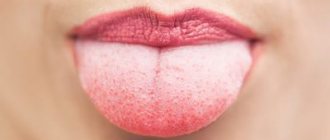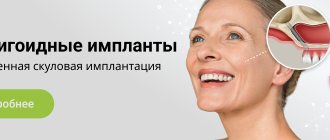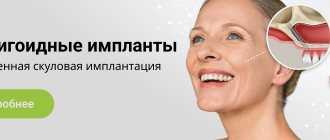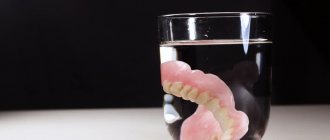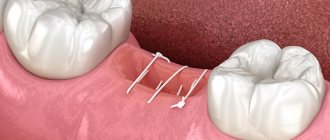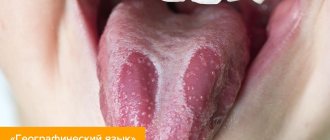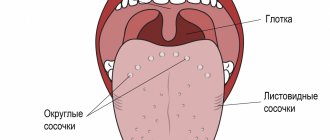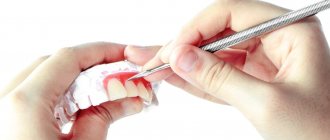When red bumps appear on the tongue, at the tip or closer to the throat, you need to find out what this phenomenon is. Such rashes often bother not only adults, but also children. And since they arise for a wide variety of reasons
, you need to figure out whether pimples pose a danger and choose the optimal treatment method.
Classification of pimples
There are many types of pimples on the tongue. They are classified according to four characteristics: color, location, size and pain.
Color
- Natural, red-pink.
Growths that do not differ in color from the tongue and are painless are warts or condylomas. - When red or bloody pimples
, such as in the photo, their cause may be a burn, herpes, or allergic reactions. - Red bumps that turn black
are associated with mechanical damage or injury. The black color appears due to microhemorrhage.
Location
- On the tip of the tongue.
Often this place is subject to injury and various damage, which can cause inflammation. First, a small bump appears on the end of the tongue, then a painful red or black pimple. - On the side.
In most cases, pimples are localized in this place, as a result of stomatitis, as well as benign neoplasms. - At the larynx.
Red pimples on the tongue closer to the throat often turn out to be benign formations: condylomas, warts. - Under the tongue.
Lumps and bumps in this place (near the frenulum) in both adults and children indicate inflammatory processes: tonsillitis, sore throat, pharyngitis.
The size of the formations can be large, medium or small.
Presence of pain
- Painful sensations.
Pimples resulting from injuries, burns, inflammatory and infectious lesions of the oral cavity and larynx. Pain manifests itself when touching the tubercles; it hurts a person to speak or swallow. - There is no pain.
In most cases, painlessness is characteristic of warts and condylomas. Benign neoplasms often affect the root of the tongue; you can see how it looks with pimples in the photo.
Diagnostics
As we found out, bumps in the oral cavity can have different etiologies. Therefore, the purpose of tests will depend on the expected diagnosis. Before conducting laboratory tests, a specialist conducts a detailed examination of the tumor.
Usually, doctors always recommend doing a general blood and urine test. This will help identify the presence of inflammation.
If infectious diseases are suspected (herpes, papillomatosis, stomatitis), PCR diagnostics may be required.
For benign and malignant tumors, a biopsy is prescribed. A small piece of tissue is taken from the cone and sent for microscopy. Based on the results of the study, one can judge the type of neoplasm.
Causes of pimples on the tongue
The main causes of rashes:
- Traumatic injuries, burns. It is not uncommon for the tip or side surface of the tongue to be damaged by cutlery, excessively hot food, or one’s own teeth.
- Weakened immunity. When pimples appear on the tongue closer to the throat, at its base or near the frenulum, this may indicate reduced immunity. A variety of pimples and bumps are localized here: condylomas and warts, candidal bumps.
- Development of benign and malignant tumors.
- Poor nutrition, bad habits. If you violate the rules of nutrition, excessive consumption of spicy, hot, rough foods, an irritating and traumatic effect on the mucous membrane occurs, which provokes the appearance of pimples. Excessive smoking and alcoholic libations also cause diseases of the mucous membranes in adults.
- The causes of lumps at the end and root of the tongue may be allergic. Allergic disease manifests itself not only on the skin, but also on mucous membranes.
Large bumps located close to the pharynx make it difficult to swallow food and can lead to breathing blockage.
- If pimples appear on the tongue closer to the larynx, they could be caused by various diseases of a chronic, viral and infectious nature.
- Neglect of hygiene rules. Eating unwashed foods and irregular oral hygiene not only in children, but also in adults, causes irritation of the mucous membrane and, as a result, the appearance of inflamed pimples.
Candidal stomatitis
Many are accustomed to thinking that stomatitis caused by the Candida fungus virus makes itself felt only through ulcers and rashes that appear on the gums and palate. But in fact, its main symptom is a dense whitish or grayish coating of curd consistency on the tongue. If you try to remove such plaque, you will find blisters underneath that itch, hurt, and bleed. As a rule, small blisters are found around the perimeter of the tongue.
The photo shows candidal stomatitis
Often the disease is provoked not only by weakened immunity, dysbiosis and long-term use of antibiotics, but also by the presence of advanced dental pathologies and lack of proper oral hygiene.
Red bumps on the tongue closer to the throat - what are they?
In most cases, bumps at the base of the tongue, pimples on the side, growths on the tip of the tongue are manifestations of the following diseases:
- Diseases of the mucous membrane of an inflammatory nature (glossitis) are accompanied by the formation of painful red rashes on the mucous membrane, in severe form - abscesses, phlegmons.
- Metabolic disorders, vitamin deficiency. Such conditions are characterized by redness and enlargement of the taste buds, which often become inflamed and acquire a red-white color.
- Herpes, characterized by the appearance of painful red pimples and blisters.
If red bumps or nodules appear on the base of the tongue, this may be a symptom of pyogenic granuloma. The formations consist of blood vessels and are localized in the wounded area. Pathology occurs due to injuries and damage to the mucous membrane. When touching the formations, a person feels a sharp pain.
- Digestive disorders (malabsorption). Pimples on the root, all over the surface of the tongue, are one of the symptoms of this pathology.
- Candidiasis (thrush). A disease that often affects newborns. The child's tongue becomes covered with red bumps and a cheesy coating forms. The baby behaves restlessly, cries, and has difficulty swallowing; these symptoms are caused by itchy red-white pimples and dry mouth.
- HPV – human papillomavirus. Formations are localized in any area of the tongue: at the tip, root, side. The bumps on the tongue closer to the larynx cause particular discomfort, as they interfere with swallowing and create the sensation of a foreign object in the mouth.
- Allergic diseases. The rashes do not hurt, but they interfere with swallowing and speaking.
- Diseases common to children: chickenpox, measles.
Herpes virus
A scattering of small blisters on the tongue (in any area) can also signal the development of a herpetic infection. In this case, the neoplasms look like transparent blisters filled with fluid or pus. A few days after their appearance, such blisters burst, and their contents enter the oral cavity and contribute to the spread of infection to healthy tissues. Very painful ulcers appear at the site of the formations, causing discomfort while eating food.
Pathology may be herpes
Treatment of pimples on the tongue
Carrying out an examination of the mucous membrane of the tip, side, and root of the tongue, the doctor examines the red pimples and growths. Based on laboratory tests, examination and medical history, the specialist makes a diagnosis, finds out why the disease appeared, and determines the therapeutic direction. The classic method of treatment is medication:
- Antibiotics are used to destroy bacteriological pathogens
. Effective drugs for local action: Bioparox, Fuzafyungin. As well as medications for systemic treatment: Amoxicillin, Cefadroxil. - To prevent the rashes from becoming inflamed, anti-inflammatory drugs are prescribed: Stomatidin, Ingalipt, Lugol.
- Antiseptic agents accelerate wound healing: Chlorhexidine (it is necessary to apply lotions and rinses).
- Dysbacteriosis, which can cause rashes on the mucous membranes, is treated with probiotics: Bifidumbacterin, Acipol, Linex, Bifiform.
- If pimples appear on a baby's tongue, they are often caused by fungal infections; thrush is treated with antifungal drugs
. It is worth doing daily rubbing of the tongue, cheeks and lips with a broad-spectrum solution of Candide. After just 1–2 days, less plaque forms, and after a week, the signs of the disease completely disappear. - Allergic reactions are eliminated with the help of antihistamines: Fenistil, Cetrin, Erius.
Pimples appeared on the tongue: treatment at home
Having determined the nature of the rash, the doctor can prescribe a comprehensive treatment of the disease (drug and herbal treatment) or non-drug treatment at home. Pimples on the root, tip, and near the frenulum of the tongue can be removed using folk remedies.
Herbal medicine
Herbal decoctions and infusions effectively remove pimples both on the tip and at the base of the tongue. The most effective rinses are chamomile, St. John's wort, and calendula. Herbal decoctions are especially effective when the rashes are inflamed.
Method for preparing the decoction: pour a teaspoon of herbs into a glass of boiling water, leave for about 15 minutes, and cool. You need to rinse your mouth 2-4 times a day.
Infusions and decoctions can be taken orally, this will help alleviate the symptoms of the disease, relieve inflammation, and help stabilize metabolic processes.
Compresses and lotions
If the formations are inflamed, pain and inflammation can be relieved by applying a cotton swab moistened with a herbal decoction of chamomile and calendula to the affected surface.
You can numb the surface of the tongue using therapeutic and prophylactic toothpaste, which is applied for 2 minutes. The paste relieves pain, has a calming, anti-edematous and anti-inflammatory effect.
Rinsing with antiseptic solutions
They help treat inflammation of the mucous membrane, eliminate tubercles on the tongue both at the very beginning and closer to the throat. In the fight against the disease, the use of Chlorophyllipt and Chlorhexidine is common. The preparations can be used as rinses and are effective for irrigating the oral cavity. Procedures are carried out several times a day.
Forms of the disease
According to the ICD, aphthous stomatitis is assigned code K12.0. There are two forms of the disease - acute and chronic. The second is characterized by frequent relapses and may be a consequence of inadequate or untimely treatment of acute inflammation.
An acute disease is characterized by severe symptoms. It begins quickly, severe pain occurs at the site of mucosal damage, and the child may refuse to eat. In some cases, body temperature rises, weakness and lethargy occur.
The chronic form is characterized by a sluggish course; the child’s general well-being does not suffer. The disease can recur up to several times a year.
Preventive measures
Simple preventative measures will prevent the onset of the disease. Basic rules of behavior and hygiene:
- Fruits and vegetables should always be washed before consumption.
- Food should not be excessively hot, cold, spicy or rough.
- The chewing process should be slow, which will prevent tongue biting.
- Personal hygiene should be observed: dental and oral care.
- It is necessary to have individual cutlery and a toothbrush.
- The brush should be renewed monthly. Change immediately after an illness.
- Regular visits to the dentist are recommended. It is necessary to treat diseases of the teeth and oral cavity in a timely manner, remove tartar and plaque, because these are the main sources of infection in the mouth.
- It is necessary to maintain adequate physical activity, which will increase immunity and the condition of the entire body.
Any pimple, growth or tubercle on the mucous membrane, both in an adult and in a child, requires close attention. You should not treat the bumps yourself; only a doctor can do this.
You should not pierce or try to squeeze out pimples on the mucous membrane; such actions can lead to negative consequences: the growth of foci of inflammation, the appearance of open wounds as a result of injuries.
The best thing a person can do if they have bumps on their tongue is to see a dentist or therapist. Such a decision will speed up recovery and prevent possible complications.
Thermal and chemical burns
Pathology may indicate that a person has consumed too hot foods and drinks. The problem often occurs among smokers, as cigarette smoke can lead to irritation and damage to delicate tissues.
A burn can be caused by eating sour and spicy foods, after which a feeling of “on edge” often appears on the tongue. The problem is also caused by the independent use of various drugs, as well as aggressive agents in folk recipes for the treatment of diseases of the oral cavity (hydrogen peroxide, iodine, potassium permanganate, garlic, alcohol).
A blister may occur as a result of a burn.
As a rule, in such situations, the very tip of the tongue becomes blistered.
